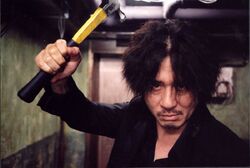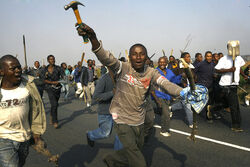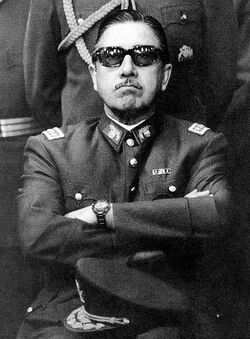
The HAMR flag, also used for Southern Kings

Southern Kings, as proclaimed by HAMR

Kim Dae-su symbolically wielding a hammer

General Matombé and his troops cheering

Dae-su in military outfit after his arrest
The High Authority of the Movement for Revolution (HAMR) was a militant group based around Portland in southern Kings. It was a political organization that made its first appearance in the Lovian Civil War. HAMR combined local anti-government and anti-Kings sentiments and seeked to establish an autonomous state with Portland as its capital. Kim Dae-su was one of the leading figures of HAMR, which was formed out of an extremist wing of the Green Cross Movement. This makes that the HAMR program was a radicalization of historic sentiments rooted in the conflict between the inhabitants of southern Kings and the authorities in Newhaven/Noble City. The movement also heavily drawed on Dae-su's personal views including a pastoral conservatism and the romanticizing of nature. The movement used a hammer for a symbol, signifying the power of the working class. HAMR had ideological ties with the Southern Families and the Green Cross Movement; they share a common discourse of southern identity and conservative, anti-modern ideals. On October 22nd, 2011, it surrendered.
History[]
Relation to GCM and Southern Families[]
HAMR is in essence a radicalized version of the Green Cross Movement (GCM). At the beginning of the Lovian Civil War the GCM was reluctant to the usage of violence and condemned the riots, not unlike the Oceana nationalist movement. GMC members where however divided over how to fill in the local authorities now the grip of Newhaven and Noble City was weakening. A group of radicalized members left the GMC to form a new 'revolutionary' organization: HAMR. During the excesses performed by HAMR-associates in the Civil War, the Green Cross Movement kept distancing itself from the extremist discourse used by Kim Dae-su and others.
While the GMC remained true to its tenets of civil and peaceful actions, the Southern Families proved more susceptible for collaboration. It was Gep Mecano II who united the eleven main southerner families behind HAMR and its goals. The Southern Families have a lot of power in Portland and employed in to force the hand of local authorities and even the GMC, which stood idle as HAMR attempted to install its own regime. This cooperation with HAMR troubled the relationship between the Southern Families and the GMC.
As a result of HAMR's successful charm offensive towards the Southern Families, the GMC lost its monopoly on southerner issues. It is possible that in the future, the GMC will reform to a local liberal party or maybe diminish altogether.
Involvement in the Civil War[]
The HAMR movement held a raid on the southern part of Kings during the Lovian Civil War. In this first public appearance of HAMR, they successfully cut off Portland from the rest of Lovia. The movement set up several camps surrounding Portland and transformed the area in its base of operations. HAMR front man Kim Dae-su announced that the goal of HAMR was to 'free the hard-working people of southern Kings from the yoke of the federal government and the false prophecies of socialism'. He also spoke negatively of Yuri Medvedev who's political hold over Kings he described as 'having a personal protectorate'. HAMR further assured that 'all enemies of the people shall be granted the right to a trial' and that no violence shall be used but for defending the interest of the southern Kings' families.
In a second stadium of the conflict, HAMR assured an alliance with the local politicians of Portland connected to the Southern Families. Most notably, Gep Mecano II united the old might of the eleven main families of southerners. In exchange for their allegiance to HAMR, Mecano was made mayor of Portland. In this phase it becomes unclear how far civilian institutions like the Southern Families and the Green Cross Movement collaborated with HAMR and joined in the violence. The boundaries between the political and military arm of HAMR is also blurred.
On October 23rd, 2011, troops of armed HAMR members started surrendering to the UNLOR forces. This was accompanied by a split between the majority of affiliates, who wanted to prevent further destruction of their property and lands, and a minor core of violent extremists. Within a few hours UNLOR regained control of the Portland area. Important figures within the movement, such as Kim Dae-su and 'general' Thomas Matombé, were arrested.
Judicial uncertainty[]
After the arrest of all leading figures behind the HAMR movement, a lot of judicial uncertainty remains. Since it is hard to determine the exact boundaries of the movement, it is unlikely there will be a trial against the legal personality of HAMR itself. Rather, a strategy that considers the complex reality will sort more effect. Thomas Matombé, together with others who performed acts of criminal and violent nature against the civil population and UNLOR officers, will be put to trial individually. People like Kim Dae-su and Gep Mecano II, who have ties with the movement but who's involvement in the riots is unclear, are held under arrest. It remains however unclear whether they will be prosecuted.
Also unclear is whether the HAMR movement can continue to exist, be it in its current form or any other. Popular resistance against the movement is big in all of Lovia but southern Kings. Especially amongst inhabitants of Portland, a notable minority speaks out in favor of a 'political' and 'clean' movement. They stress that folks like Matombé acted on their own behalf, and never got formal approval from any institution. Others point out the clear collaboration between (representatives of) the Southern Families and HAMR with rioting elements.
Organization[]
Symbols[]
The most important symbol for the movement is the hammer, representing the power of the working class. This is reflected in the flag but also in the name of the movement, of which the abbreviation is the acronym 'HAMR'. This can be read as 'hammer'. The revolutionary movement also used a 'southern cross' in its flag, a cross existing of two pairs of stroked being placed so they form a cross. This is evident in the right corner of the flag. The southern cross is a common symbol with the southerners of Kings.
Also important in the star-spangled circle, a white circle containing eleven red stars. This symbol was used when the eleven most important southern families united to form a fist against Newhaven/Noble City. It is included in the movement's flag to show the roots of the movement. Colors associated with HAMR are the blue of King's waters, the white of the southern beaches and the red of the people's blood sacrificed for the cause of freedom.
Program[]
The HAMR program has roots in southerner nationalism, classical liberalism and conservatism. The movement's ultimate goal is to establish an independent state in Southern Kings. This state would be governed as an agrarian commune with property and family is its cornerstones. The ideas of the HAMR movement are closely related to the personal beliefs of Kim Dae-su. As a political entity, HAMR operates under its 'five tenets of freedom'. These focus on liberal and conservative values such as property, family and state-hood. Socialist and pro-Lovian elements are explicitly mentioned as enemies of the people. The five tenets are:
- The southerners have the right to their own state, Southern Kings, which needs to be protected against federalists/unionists.
- The southerners have the right to property, which needs to be protected against communist and socialist influences.
- The southerners have the right to choose and practice the religion of their choosing.
- The southerners have the right to a job which can take care for their families.
- The southerners have the right to exploit the land of their ancestors.
A split occurred early on in the movement's history between Dae-su and HAMR general Thomas Matombé. Matombé sought to push trough a Christian exclusivity in the HAMR-controlled region of Kings. He took radically violent action against what he called 'disloyal traitors'. The more tolerant Dae-su disapproved of both the exclusivity and the violence, stating that Matombé was not operating in line with the tenets.
Notable members[]
- Kim Dae-su: intellectual leadership and spokesman of the High Authority.
- Thomas Matombé: head of the militia wing of the Revolutionary Movement.
- Gep Mecano II: representative of the eleven Southern Families.